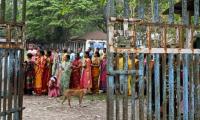The best measure of the strength of a democracy is the government’s tolerance of dissent. But once again what we have seen is a callous disregard for the norms of a healthy society. Just a day after legislation was enacted effectively outlawing strikes by PIA employees for six months, protesting workers in Karachi were struck against with baton-charge, water canons and teargas as the protestors tried to make their way to the airport. In the confusion and chaos that followed, three protestors were killed and many injured including media personnel. Both the Rangers and police have denied using lethal force, but the three employees were killed by gunshot wounds and suspicion has fallen where it tends to fall in such circumstances. Now, with this escalation in conflict, the pilots union Palpa has also decided to join the protestors and we can expect significant flight delays and cancellations. The Joint Action Committee of PIA has offered to hold talks but the government seems in no mood for compromise. Before the debate over the merits of privatisation is held, though, it needs to be made clear that the use of force and the violent language used by some government officials a day before were hardly justified, and workers unions should not have the right to peaceful protest taken away from them. In trying to push through its privatisation plan, the government has criminalised legitimate dissent and the prime minister too is now threatening the strikers with jail and job loss.
The various PIA unions have long been blamed for the airline’s financial woes. It is certainly true that the national carrier has one of the highest employees-to-aircraft ratios, and that political parties have used PIA as a way of giving jobs to their own workers, but this easy explanation overlooks decades of mismanagement. This is why the view has been put forward that rather than quickly trying to sell off PIA to the first bidder, without any strong guarantee that the rights of workers will be protected, the government needs to hold talks with the unions and work out a solution that both helps PIA and those who work for it. The fear now is that after overreaction and the three deaths that must be inquired into, we have reached an impasse where reasoned dialogue will be difficult. The IMF will continue to push its privatisation agenda on a government that does not appear to be in a position to show backbone in its dealings with the international financial institution. By outlawing strikes, it has already shown what lengths it will go to push through its agenda. Even though the government promised no jobs would be lost in the privatisation, its heavy-handedness now will have created a trust deficit. The opposition parties, including the PPP and PTI, are now also threatening to join the protests. The worry now is that, as after the Model Town killings, politics will come in the way of investigating what transpired. It took only two days for an already bad situation to be worsened through a needless escalation.
Representational image. —APP/FileIf you live in Karachi, or anywhere else in Pakistan for that matter, you have...
Screengrab shows X services down in Pakistan. — Geo.tvIt has been two months since social media platform X has been...
Health experts estimate an 8.0 per cent and 5.0 per cent increase in hepatitis B and C related deaths, respectively,...
PTI has managed to carve out a tough-to-defeat position in Pakistan’s politics and polity both
Rain on Sunday alone led to the deaths of 12 people – two in Balochistan, six in Khyber Pakhtunkhwa and four in Punjab
India seems to be following Israel model of carrying out assassinations on foreign soil of people it sees as a threat...







